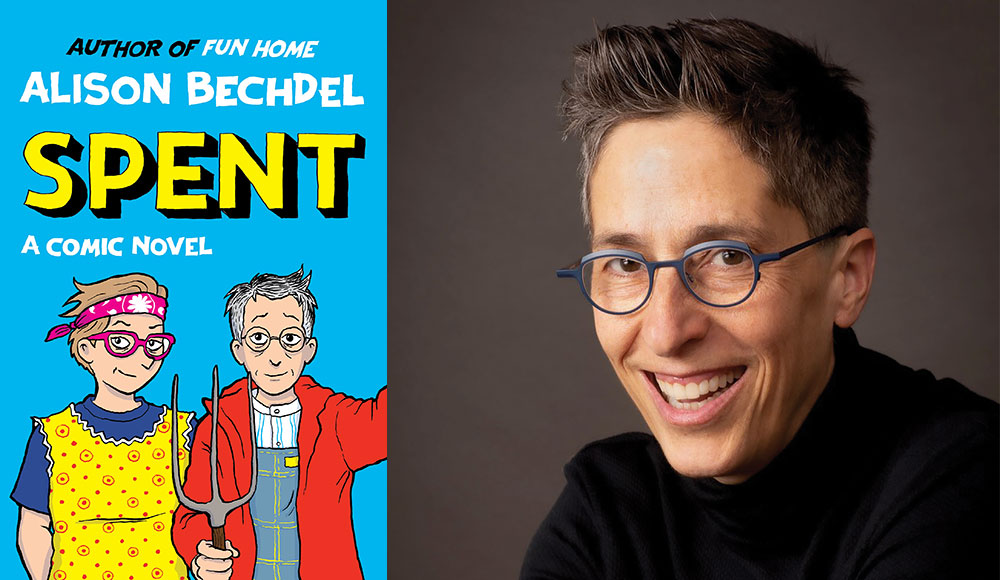Few people’s names are associated with “tests.” There’s the (Hermann) Rorschach Test, which gauges people’s pareidolia, finding meaning in nebulous patterns. The (Alan) Turing Test, where one can (hopefully) distinguish between machine and humans, notably brought to greater attention through the movie Blade Runner. And there is also the (Alison) Bechdel Test, which is applied to artistic works to see if at least two women have a conversation that is not about men.
For Bechdel, having a test named after her was never the goal, but more of a side effect, manifesting after decades of creating comic strips. Her latest work, Spent: A Comic Novel, goes full meta, as it’s about a cartoonist named Alison Bechdel (true) who runs a pygmy goat sanctuary farm (not true) in Vermont (true). She’s alarmed by the news of a planet going through an extreme climate crisis, and a country bordering on civil war (true). Can she save humanity by publishing a self-critical memoir about her own greed and privilege (remains to be seen)?
Bechdel didn’t start by airing out the skeletons in her closet. “I had a lot of practice doing my comic strip (Dykes to Watch Out For),” says Bechdel from her home in Vermont. “It was kind of a soap opera comic strip for many years, which was not about my real life, but just all made up.”
Like all artists, Bechdel began to feel like there were other stories she wanted to tell. Real stories. “I had this kind of shift when I was around 40. I switched over to telling this real story from my life about my dad, which turned into Fun Home (A Family Tragicomic),” Bechdel says. It was a major transformation, as Fun Home hinged on revealing family secrets.
Fun Home became a major success. Spending two weeks on The New York Times bestseller list, Fun Home wasn’t your average graphic novel. Its themes ranged from suicide and emotional abuse to sexual identity and gender roles, all wrapped up within the autobiographical storytelling of Bechdel’s dysfunctional family. Fun Home soon became the studied subject of academics around the country.
Bringing her mother onboard proved to be a little more difficult. Family secrets are secrets, for a reason. Luckily, Bechdel had time, as it took seven years to complete. Partly because she photographed herself as the models for every character in the novel.
“It was a big deal,” Bechdel begins. “It was scary for me to tell my mother I was going to write about my father’s closeted life. Which, of course, revealed a great deal about her. My brothers had fewer concerns and objections, but we had to go through a process too.”
Scholars can analyze Fun Home for decades, but simply put, what propelled it into the social consciousness of America, was its honesty. Every family has its secrets, things that family members circle around and protect. “I think it was a relief for people to see somebody willing to take the chance,” Bechdel says.
Besides the public acclaim, and book sales, Bechdel knew she hit a nerve when new fans would come up to her to share their trauma. “It happens a lot,” Bechdel says. “And I always feel bad because I’m not really the best listener. I’m good at sharing my own stuff, but I’m not a therapist. I’m not really that interested in anyone but myself,” Bechdel admits with a laugh.
Then there’s the Bechdel Test. Directors and script writers and authors, have relooked at their art through this new prism and discovered that nowhere in their product do two women have a discussion that doesn’t have to deal with men. Apparently Shakespeare never did it, although it could be argued endlessly. But it’s surprising to see somebody like Quentin Tarantino easily passing the Bechdel Test in many of his movies. “I can’t guarantee that Quentin applies the test to his films, but I remember watching Jackie Brown and thinking, ‘Wow. This movie totally passes the test,’” says Bechdel.
As far as having a test named after her, Bechdel is vocal. “I’ve gotten used to it. I feel like our culture likes to believe that individual people do things, when in fact, it’s always the movement of people, and groups of people, that make these kinds of changes. Like I didn’t make that up, really. First of all, I stole it from friends. And second of all, it’s just like the basic principles of feminism. But I guess it’s easier to attach it to a name. So whatever, I’ll take it,” Bechdel says.
Alison Bechdel will be appearing at 7pm on May 28 at the Rio Theatre, 1205 Soquel Ave., Santa Cruz. Tickets: $39. bookshopsantacruz.com
‘I feel like our culture likes to believe that individual people do things, when in fact, it’s always the movement of people, and groups of people, that make these kinds of changes.’
—Alison Bechdel













